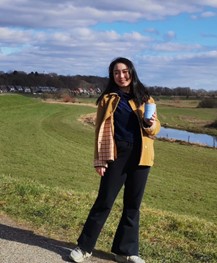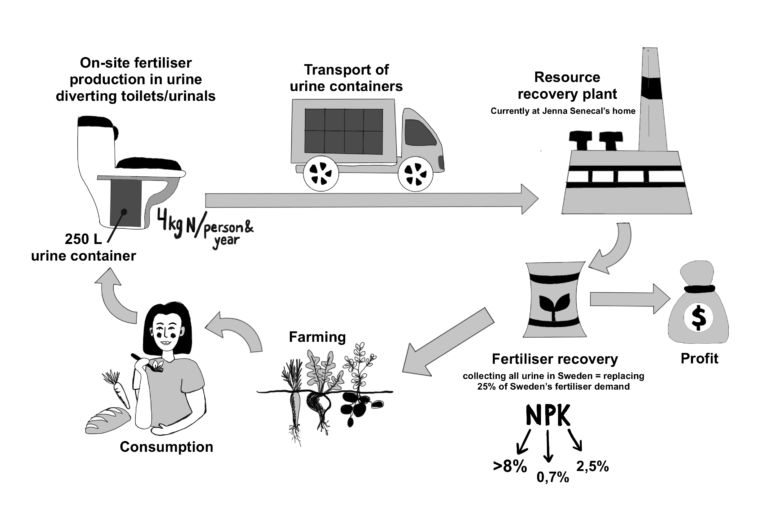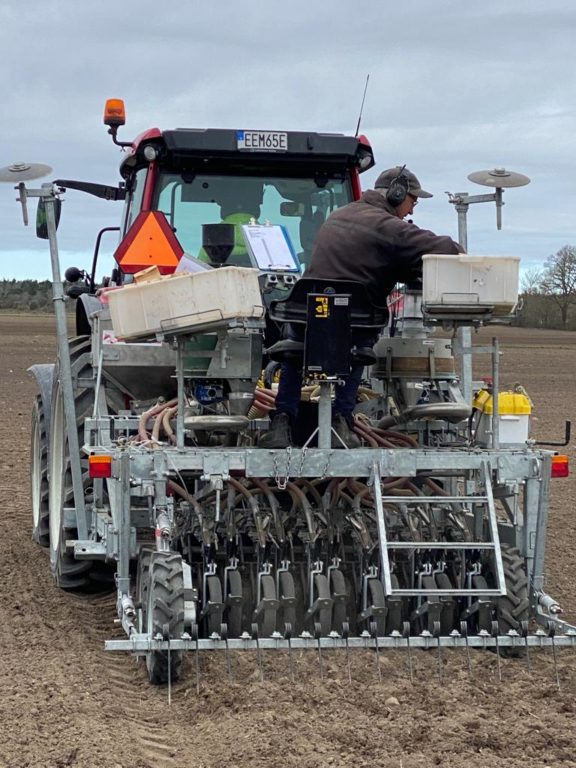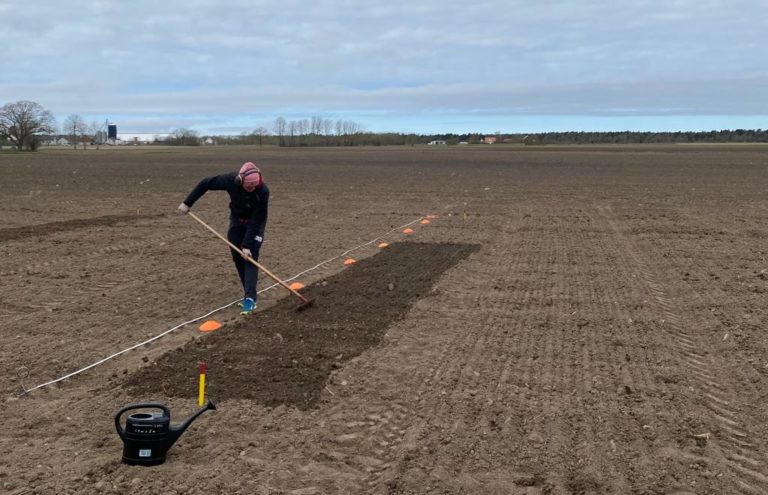 Ya Gao comes from China and previously received her Master’s degree in Environmental Technology at Wageningen University and Research in the Netherlands and her Bachelor’s degree in Environmental Sciences at Tongji University in China. After the graduation from her previous study, Ya Gao worked in a green building sustainable consultancy company in Shanghai as a project engineer for one and a half years. In May 2023, Ya Gao has joined the Kretsloppsteknik group as a PhD student working for the EU project P2Green. The main focus for her PhD study will be the urine dehydration research that aims at dehydrating the acid-stabilized human urine and recovering the nutrients contained in the urine for the use of plant fertilizers.
Ya Gao comes from China and previously received her Master’s degree in Environmental Technology at Wageningen University and Research in the Netherlands and her Bachelor’s degree in Environmental Sciences at Tongji University in China. After the graduation from her previous study, Ya Gao worked in a green building sustainable consultancy company in Shanghai as a project engineer for one and a half years. In May 2023, Ya Gao has joined the Kretsloppsteknik group as a PhD student working for the EU project P2Green. The main focus for her PhD study will be the urine dehydration research that aims at dehydrating the acid-stabilized human urine and recovering the nutrients contained in the urine for the use of plant fertilizers.
Tag: Source-separating sanitation systems
Sanitation360 awarded the Innovative Startups Step 2 grant by Vinnova!
Sanitation360 (spin-off company from our urine drying group at Kretsloppsteknik, SLU) has been awarded the Innovative Startups Step 2 by Vinnova. During 2021-2022, Sanitation360 used the funds from Step 1 to assess the market potential for manufacturing and selling the urine-drying technology in South Africa. During that time, S360 found the partners perfect partners – Scandinavian Water and Sanitation and Sanitation Ambassadors. Together, they will design, build and implement the drying system in South Africa. The generated fertilizer will also be used. The project runs from now till May 2024. Stay tuned for more up-dates.
More about the funding: Companies that have further need for financing after Innovative Startups step 1, finalized a project in step 1, can apply for funding in step 2. In step 2, Vinnova can contribute up to 90 % of the project budget, up to a maximum of 900,000 SEK. More information about the Vinnova funding can be found here: https://www.vinnova.se/en/calls-for-proposals/innovative-startups/
Human urine: A novel source of phosphorus for vivianite production
 In the latest article published in Science of the Total Environment (STOTEN), Prithvi Simha and colleagues (Chibambila Simbeye, Caitlin Courtney, and Nico Fischer) show for the first time that we can produce vivianite from human urine. For those who don’t know, vivianite is iron phosphate ((Fe(II)3(PO4)3·8H2O) and is in high demand in the electronics industry for lithium-ion battery production as well as in the art industry as a pigment in paint. It can be sold for as much as $100-500 per kg. Considering that struvite and calcium phosphate can typically only be sold for $1 kg−1, recovering P as vivianite would likely be significantly more profitable.
In the latest article published in Science of the Total Environment (STOTEN), Prithvi Simha and colleagues (Chibambila Simbeye, Caitlin Courtney, and Nico Fischer) show for the first time that we can produce vivianite from human urine. For those who don’t know, vivianite is iron phosphate ((Fe(II)3(PO4)3·8H2O) and is in high demand in the electronics industry for lithium-ion battery production as well as in the art industry as a pigment in paint. It can be sold for as much as $100-500 per kg. Considering that struvite and calcium phosphate can typically only be sold for $1 kg−1, recovering P as vivianite would likely be significantly more profitable.
In this work we determined ideal operating regions for vivianite production from human urine. We showed that overdosing iron exerted a competitive effect that suppressed the precipitation of other precipitates and could also compensate for changing urine compositions. Overall, the highest yield and purity was 93% and 79% respectively. We showed that the presence of organics in real urine ultimately affected the purity. Thank you to the Water Research Commission for funding this work and to the SLU – Swedish University of Agricultural Sciences‘s August T Larsson Guest Research program for Dyllon’s current research visit to SLU.
Nicola Parfitt’s MSc thesis: Centering Farmer Perspectives on a Dry-Fertiliser Made from Human Urine
 Hi, my name’s Nicola Parfitt and I recently spent a wonderful week on Gotland interviewing farmers about their perceptions of human urine as a fertilizer. I did this as part of my master thesis in Environmental Studies and Sustainability Science at Lund University, which I can’t believe is already coming to an end in June.
Hi, my name’s Nicola Parfitt and I recently spent a wonderful week on Gotland interviewing farmers about their perceptions of human urine as a fertilizer. I did this as part of my master thesis in Environmental Studies and Sustainability Science at Lund University, which I can’t believe is already coming to an end in June.
I came into contact with this topic after Jenna Senecal, the CEO of Sanitation360 who recycles human urine and turns it into a fertilizer on Gotland, held a lecture as part of one of the courses I was taking. The potential of ecological sanitation and nutrient recycling to reduce eutrophication, contribute to circular farming and also provide decentralized toilets in countries where access to basic sanitation facilities is still low, made me fall in love with the concept. However, for the loop between sanitation and agriculture to be fully closed, farmers need to be willing to use the end product – and that’s how my thesis idea came about.
Barley field trials with Granurin fertiliser pellets have begun!
 About a month ago now, Sanitation360 finally started this year’s field trials where barley is being grown and fertilized with human urine. In addition, this is an extra special year because we’re not only trialing our dry-fertilizer but liquid urine too (see top photo)! It’s going to be really interesting to compare the barley yields between these two different forms of human urine.
About a month ago now, Sanitation360 finally started this year’s field trials where barley is being grown and fertilized with human urine. In addition, this is an extra special year because we’re not only trialing our dry-fertilizer but liquid urine too (see top photo)! It’s going to be really interesting to compare the barley yields between these two different forms of human urine.
In the two photos you can see Hushållningssällskapet Gotland, our local agricultural consultancy partners, using a seed drill to plant the barley and the solid urine fertilizer! Can’t wait to share the results!

A milestone for Granurin, #urine #fertiliser with >15% nitrogen!
We are extremely happy to share our latest milestone – something that we set as a aim almost ten years ago – to produce a dry urine fertiliser with the same nutrient content as that of synthetic fertilisers so that we can replace their use in agricultural systems. Earlier this year, we managed to produce the first 20 kg batch of our solid urine based fertiliser, Granurin, with >15% nitrogen content. The urine was collected last year from public urinals on Gotland as part of the N2Brew project, and treated by Sanitation360 AB, with final processing and fertiliser pelletisation done at SLU – Swedish University of Agricultural Sciences by Bjorn, Jenna and Prithvi.
SLU Kretsloppsteknikn hosts Wageningen’s ETE department

Dyllon and Caitlin at SLU as part of the August T Larsson Guest Researchership

We had many discussions and brainstorming sessions about urine treatment technologies and nutrient recycling, with a growing list of new things to investigate. They also got to meet new urine researchers and see the SLU lab and urine collection facilities. Soon, Dyllon will also travel with the rest of our group to Gotland where we are hosting a demo day, showcasing our urine recycling approach and toilets/companies that are enable this paradigm shift in wastewater treatment. As Dyllon says in his recent LinkedIn post, “the future of pee-cycling is indeed bright 😊”.
New JTI Grant will investigate removal of micropollutants from reclaimed water

Funding for a new project “On-farm biochar filters for removal of organic micropollutants from reclaimed water for agricultural irrigation” has been approved by the Swedish Agricultural Research Foundation. The main applicant is Oksana Golovko from the Department of Aquatic Sciences and Assessment at SLU, with co-applicants Prithvi Simha from our research group and the biochar producer Waila on Gotland. Together with their newly hired PhD student, Maximilian Tyka, and Researcher Alberto Celma, they will carry out this project over the next four years.
Abstract: The use of safely reclaimed water for agriculture irrigation is a promising solution to address water shortages, especially on Gotland. One primary concern is the introduction of organic micropollutants (OMPs), such as pharmaceuticals and other chemicals, into the agricultural ecosystem and food chain. OMPs can be potentially persistent, bioaccumulative, toxic and could harm human health if they are present in agricultural products. This project aims to develop techniques to remove OMPs from reclaimed water using biochar, so that it can be safely reused for agricultural irrigation of food crops. The objectives are to 1) identify the most relevant OMPs in reclaimed water, 2) assess the capacity of biochar prepared from different renewable feedstock for removal of OMPs, 3) evaluate the thermal degradation of OMPs during re-pyrolysis/regeneration of biochar, and 4) communicate the results with food industry stakeholders.
Demo Day “Urine to Fertiliser” on Gotland – come and attend!
SLU and Sanitation360 will be hosting “Demo Day – Urine to Fertilizer”. We are what we eat and what we eat is what we excrete. Urine contains 80% of the plant nutrients we consume. These nutrients can and should be re-used as fertilizer. If you would like to learn about how we can re-use the nutrients in our urine as fertilizer, come and attend. You will also have the opportunity to touch and sit on toilets that are enabling this to happen.
When: June 13th @ 16h00
Where: KULTURUM, Specksrum 6, 621 55 Visby, Gotland
Link to the LinkedIn page of the demo day: https://www.linkedin.com/events/demoday-urinetofertilizer7066764140874260480/
Link to the Facebook page of the demo day: fb.me/e/153OuqStl



